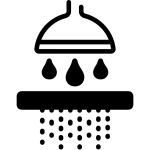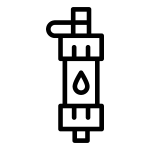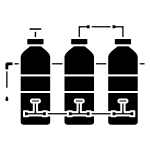If you’ve ever turned on your faucet and been greeted by a smell that’s eerily similar to rotten eggs, you’re not alone. Many homeowners encounter this unpleasant odor and often wonder: Why does my faucet water smell like rotten eggs? At Cuoll, where we specialize in water filters, purifiers, and home improvement essentials, we understand how important clean, fresh-smelling water is for your daily life.
This comprehensive guide explores the causes, health concerns, and practical solutions for smelly tap water — and how our water filtration products can help eliminate the problem for good.
🚨 What Causes Faucet Water to Smell Like Rotten Eggs?
The most common culprit behind the rotten egg smell in faucet water is hydrogen sulfide gas (H₂S). This gas forms due to:
1. Bacterial Contamination
Bacteria naturally present in water systems can produce hydrogen sulfide gas when they break down organic matter, especially in anaerobic environments (low-oxygen conditions). These bacteria may thrive in:
- Water heaters
- Wells
- Pipes or plumbing systems
2. Sulfur-Containing Minerals
Some underground water sources contain sulfur compounds like sulfates. When sulfate-reducing bacteria feed on these compounds, they release hydrogen sulfide, creating that distinctive sulfuric smell.
3. Corroding Water Heaters
Sediment buildup inside hot water heaters creates the perfect environment for sulfur bacteria. Additionally, the anode rod inside your heater may react with sulfate ions, producing hydrogen sulfide.
4. Contaminated Well Water
If you’re using well water, the smell might be due to:
- Natural geology (high sulfur content in the ground)
- Bacterial contamination of the well
- Lack of regular well maintenance
🔬 Identifying the Source of the Smell
🔹 Does the smell come from hot water only?
If yes, your water heater is likely the source.
🔹 Does the smell come from both hot and cold water?
This indicates the issue may be in the water supply or plumbing system.
🔹 Does the smell come from one faucet only?
If so, the faucet or specific pipe could be contaminated or have bacterial buildup.
⚠️ Is Rotten Egg Smelling Water Dangerous?
Hydrogen sulfide gas is generally not harmful at low concentrations, but its presence in water can indicate more serious problems:
- Bacterial growth that could pose health risks
- Corrosion of pipes, leading to metal contamination
- Poor water quality, affecting skin, hair, and even laundry
Potential Health Issues:
- Nausea or headaches from high H₂S levels
- Sulfate-rich water can act as a laxative
- Skin irritation or worsened skin conditions
Important Note: If you notice persistent odor, always test your water to rule out more serious contaminants like iron bacteria, coliform bacteria, or even arsenic.
🧪 How to Test Your Water for Hydrogen Sulfide
Before you fix the problem, identify what you’re dealing with. Here’s how:
✅ At-Home Testing Kits
Affordable and simple-to-use kits allow you to check for:
- Hydrogen sulfide
- pH level
- Iron and sulfate levels
- Bacteria
✅ Professional Lab Testing
For accurate results, send your water to a certified lab. This helps determine the best treatment method.
🔧 How to Fix Smelly Faucet Water
At Cuoll, we help customers tackle water quality problems with advanced filtering solutions. Depending on the source of the odor, here’s what you can do:
✅ 1. Flush Your Plumbing System
- Run all taps for 5–10 minutes
- Drain and refill the water heater
- Disinfect your system with household bleach or vinegar (carefully)
✅ 2. Replace Your Anode Rod
If the smell only occurs in hot water, consider replacing the magnesium anode rod in your heater with an aluminum/zinc alloy rod.
✅ 3. Clean or Replace Faucet Aerators
Sediment and bacteria can accumulate here. Remove the aerator, soak it in vinegar, and clean thoroughly.
✅ 4. Install a Whole House Water Filter
Invest in a whole-house filter system designed to remove sulfur, bacteria, and other contaminants. This is ideal if the smell affects both hot and cold water.
➡️ Recommended from Cuoll:
- CUOLL Pro-Carbon Whole House Filter
- CUOLL Multi-Stage Sediment & Sulfur Filter
- CUOLL UV Water Purifier
✅ 5. Use Shock Chlorination (for Well Water)
If you’re using a well:
- Shock the well with chlorine bleach
- Let it sit overnight
- Flush the system thoroughly
This kills sulfur bacteria and temporarily removes the odor.
✅ 6. Aeration Systems
Aeration can strip hydrogen sulfide gas from the water by exposing it to air. These systems are usually installed by professionals.
🛠️ Long-Term Solutions: Cuoll’s Expert Picks
We provide high-quality water treatment products that effectively combat rotten egg smells:
| Product | Function | Ideal For |
|---|---|---|
| CUOLL Sulfur Guard Filter | Removes hydrogen sulfide | Homes with sulfur-smelling water |
| CUOLL UV Sterilizer | Kills bacteria | Well water users |
| CUOLL Reverse Osmosis System | Removes sulfates, metals, chlorine | Drinking water systems |
| CUOLL Anode Rod Replacement Kit | Fixes water heater smells | Hot water only issues |
Visit our product page to explore our full collection of filters, purifiers, water softeners, and bath fixtures.
🛁 Other Smelly Water Issues You Might Face
Sometimes, tap water might smell weird for reasons other than hydrogen sulfide:
🔹 Chlorine Smell
- Common in treated city water
- Use activated carbon filters
🔹 Musty or Earthy Smell
- Usually due to algae or decaying organic material in the water source
🔹 Metallic Smell
- Indicates presence of iron, manganese, or copper
- Can be solved with a sediment + metal-removing filter
🧼 How to Prevent the Smell from Returning
Once you’ve removed the odor, keep it away with these tips:
- 🌀 Flush your water heater every 6 months
- 🛠️ Install a pre-filter to trap sediment
- 🚿 Use Cuoll filters for showers and drinking water
- 🧪 Test your water annually
- 💧 Maintain your well and chlorinate regularly (if applicable)
💡 When to Call a Plumber or Water Treatment Specialist
If:
- The smell persists after flushing
- The odor is strong and worsening
- You notice discoloration, cloudiness, or strange taste
…then it’s time to contact a licensed plumber or a certified water treatment expert.







